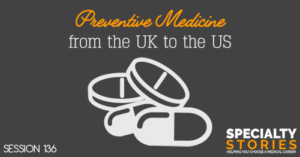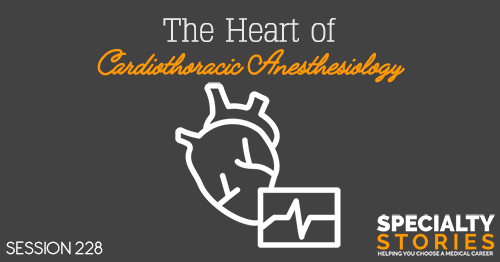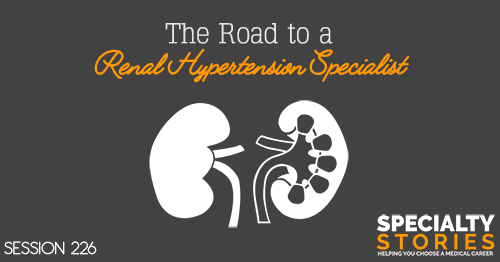Apple Podcasts | Google Podcasts

Session 136
Dr. Suneel Dhand talks about his journey into preventive medicine as an IMG. He talks about how US and UK medical schools differ, discusses the processes, and more!
For more information and resources, be sure to take a look at Meded Media. We hope to give you all the answers you need to help you on your journey towards becoming a physician!
Suneel is originally from London who went to medical school in London and is an internal medicine physician who is doing a lot of preventive medicine as well. He’s also a personal trainer.
We’re going to talk a lot about his journey, preventive medicine, internal medicine, and a little bit about the differences between the UK and the US medical school application and health care system which might be a little bit interesting even now as we’re going through this global pandemic.
Listen to this podcast episode with the player above, or keep reading for the highlights and takeaway points.
[01:39] Interest in Internal Medicine and Preventive Medicine
Suneel went to medical school in the UK. He grew up just outside London, went to medical school in a city called Cardiff, which is about two hours West of London.
While in medical school he knew he wanted the option of training overseas, especially in the U.S. So he did his USMLE at the same time he was in medical school.
Then he worked for a year in the NHS. During that time, he applied for residency training and knew he wanted to do internal medicine due to the variety of options possible. So Suneel ended up coming and doing his residency in Baltimore and did internal medicine. Looking at his options, becoming a hospitalist was really taking off.
Internal medicine was dividing up between those just in primary care and those who were just rounding in the hospital as opposed to before when the primary care doctor would round in the hospital.
Suneel chose hospital medicine. It afforded him a block schedule, gave him some time to travel, and explore other options. Meanwhile, he always had a big passion for wellness and preventive medicine. He had always been into exercising and eating well.
He grew frustrated because a lot of the problems he was seeing on an everyday basis in acute care medicine were all being driven by poor lifestyles.
“There's an exponential increase in obesity and the illnesses that come with that – diabetes, and heart disease.”Click To Tweet[03:24] A Book About Wellness
As a result, Suneel wrote a book based on natural everyday steps that can be taken to improve health and wellbeing. The premise of the book is that we have all these expensive medicines and treatments that come out, which in order to be deemed successful there should be a statistics of 1 in 20, which means a 5% chance that a certain treatment may work.
“If you look at studies and say you tell people to increase their fiber intake or go for a run every day, their health and wellbeing may be improved by 80 or 90%.”Click To TweetIt’s just incredible how these small steps that we can take every day have much higher percentage improvements from research than medicines and treatments that are in the traditional sphere of healthcare.
[04:39] Joining a Wellness Clinic
At the same time, he was working as a hospitalist and eventually that just became a repetitive cycle of seeing the same illnesses over and over again.
He then decided to step into the outpatient realm and joined a wellness clinic based in Boston. They get to spend time with patients focusing on their lifestyles, what they’re doing wrong, what they’re doing right. They do blood work on patients and may do other cardiac tests on them.
“We could have an hour or two with every patient, which is unheard of in traditional medicine, especially in primary care.” Click To TweetThey really get to the bottom of many of their chronic issues and also their future risk of developing chronic issues and guide them, hopefully motivate them to change.
Currently, he balances the wellness clinic work with his acute care work, which he still enjoys doing because it was what he was trained to do as well.
But he especially likes the fact that instead of just dealing with these problems that come up and curing them when they’re in the hospital. They’re taking a step back and hopefully preventing illness 10, 20, 30 years before it happens.
[06:52] Types of Patients and How Preventive Medicine Differs From Primary Care
Most of Suneel’s patients are professionals. Their companies have paid for them to come and have these, these wellness checks. They’re the majority of our patients and they can be ranging from age, from their early twenties, all the way up to their fifties and sixties.
He essentially sees a full range but a lot of them fill the profile of a very busy professional who’s very busy with work and family life and their health has kind of fallen off the wagon.
They need physicians to sit down with them and go over all of their numbers and risk factors, trying to get them on the right path again.
How this differs from primary care is that primary care may have five to 15 minutes with every patient. As preventive medicine specialists, they have an hour or two with every patient. They go into a lot of detail and offer services afterwards when they follow up in terms of nutrition, exercise advice. It really is more detailed and we try to motivate our patients more.
“I don't think a quick 10-minute consultation where you're just told to lose weight or eat more vegetables is quite enough for most people.”Click To Tweet[08:07] Typical Day
Suneel enjoys a varied schedule. He independently contracts out with all of the places he works. If he’s doing hospital work, his day typically starts around 7:00 AM and ends at around six or seven. His wellness clinic will also start around seven, but typically finish a little bit earlier by about 4pm.
He goes over how each patient is feeling, how they perceive their own health and wellness. Then if he’s seeing them for the first time, they’ll go over complete history, a complete medical history.
Then they’ll move on to their nutrition habits, how they feel about what they’re eating, what their typical days look like and their exercise routine.
They will talk about their stress factors in their life, how they feel about how stressed they are on a daily basis. Nowadays, it is fairly universal in society no matter what field you’re in. They share how they feel about their energy levels, how much sleep they’re guessing.
This is completely different from traditional medicine where they are really focused on what’s wrong with you and this is the cure. With preventive medicine, they are taking a step back to look at the patient’s overall level of wellbeing.
“Wellness is not merely the absence of disease. It's actually a whole host of other factors that goes into your level of wellbeing.”Click To TweetAdditionally, Suneel recently got a qualification and became a certified personal trainer with the National Academy of Sports Medicine because he wanted to give his patients more detailed exercise plans.
[12:48] What Prevents People From Doing Diet and Exercise
Most people do understand but it’s just easy to get stuck in a rut. We live in a society which is tempting us all the time about nutrition. Our diets have drastically changed over the last hundred years. We consume too many calories and carbohydrates have really become a scourge of modern day eating as well.
We go to a restaurant and we’ll just be given a portion which is outrageously large, which we feel we have to finish.
“We're living in an environment where we're full of temptations and we have the food around us. We also live in a society where being sedentary is encouraged.”Click To TweetMost people have very sedentary jobs. We don’t walk around as much as we used to. You go to pretty much any drive-through in the country, whether it’s a Dunkin Donuts or anything else where you want to grab a coffee. You’ll see people waiting in cars for like 15 minutes to go and order when they could just park and go inside and get it within two minutes.
But we don’t want to, we want to be sedentary. And when we’re in that type of environment, it’s easy to become like everyone else around you.
Suneel admits to having been there himself where he got into some bad habits during residency. He stopped working out so it was eating complete rubbish and had to force himself to get back on track.
Suneel adds that once you give them a plan and you tell them what living unhealthy is doing to their bodies and how it’s increasing their risk of illness, most people want to change. They just need that push and constant motivation.
[15:41] Message to Primary Care Physicians
Suneel feels like primary care is just probably the toughest specialty to do at the moment. And I’ve actually written articles about this.
Our primary care system is completely broken and it has to be the backbone of any healthcare system. And we’re focused on the wrong things in healthcare.
“We're spending billions on technology and increasing the number of specialists, but we're forgetting primary care.”Click To TweetSuneel points out how people tend to underestimate the power of words. Just commit to one statement during every visit to someone who needs it. It could just take a few seconds even it’s as simple as asking if they’ve eaten their greens.
Don’t beat yourself up too much about not having too much time to do it. If you can’t then make sure that within your practice there are some resources for your patients to utilize.
[18:05] The Most and Least Liked Things About His Specialty
Suneel likes being focused on prevention rather than cure. They’re not just dealing with problems after they come up. It allows them to really understand patients’ lifestyles and a lot of them do follow through on the advice given to them. He finds this tremendously rewarding.
On the flip side, what he likes the least is the difficulty for patients to stick to the plans they’ve made due to everything that’s happening in their life.
[20:14] Major Changes in the Future
There is generally much more awareness, especially among the younger generations now. Veganism is exploding right now. So we’re learning about the enormous health benefits from a predominantly plant-based diet and it’s literally everywhere.
There is much more awareness of it in the media so everything is kind of filtering down. You’ve got a lot of TV shows that are coming out now addressing this very topic, more discussion about exercise and the benefits of maintaining an active lifestyle.
“Things will change, but it's going to be led by the younger generation.”Click To Tweet[22:00] U.S. Medical Schools vs. UK Medical Schools
The content of what’s taught in medical school is fairly similar. Obviously, you have to learn the same basic physiology and it’s all one human body no matter where we are. In the U.S., it’s much more practical than theory focused.
“The UK is quite old school still with regards to relying on clinical skills and looking at the theory behind that. They’re more traditional.”Click To TweetThey’re taught like a very early 1900s kind of way where they start at the hands, look at the face and then do a very rigorous protocol in terms of inspection, palpation, percussion. Then they’ll present the findings. It’s very traditional in that way.
Medical school in the UK is also longer. It’s five to six years as opposed to four. But students in the UK don’t go to college first. U.S and Canada are the only countries in the world where you have to do college before medical school, everywhere else, you go straight from high school to medical school.
The medical students in the UK are a lot younger. When they start med school, they’re all around 18 years old and finish earlier. Training afterwards is very different. However, after you become a doctor in the UK, you will become a junior house officer for one year and then a senior house officer and typically to become an attending, the process is much longer. It might be anything from 10 to 12 years, no matter what specialty you do.
Whereas in the U.S, the post-grad trading, is much better for a number of ways, not to mention that it’s very focused. You know what you want to do, you go into it and you train rigorously and then you’ll be churned out at the other end. You’ll be fully qualified in your specialty. So whatever that happens to be here, three to six years of residency training will be entirely focused in.
In the UK, it’s a lot longer, but there’s also a lot of flexibility in between. Many doctors will go overseas. Australia and New Zealand are very popular destinations where they train for a year or two. But they will be older by the time they finish and come out as attendings, or consultants as they call it in the UK.
[25:06] Residency Training as an International Medical Graduate
Suneel’s advice to any student who wants to consider training in the U.S. is to do USMLE at the same time as you’re in medical school. It would make life a lot easier rather than go back and have to study again and then really know your options. Obviously you’re going to be limited, you’re not going to be on the same playing field.
“The U.S. medical students are going to naturally get priority as they should and you may have to settle for your second choice.”Click To TweetBut Suneel said that everything was worth it. It gave him a different perspective. He found the internal medicine training to be very focused on what he would be doing. And if you want to finish and then go back to your home country or go consider another country, the U.S. qualification would be widely recognized.
[27:32] Final Words of Wisdom
You have a great journey ahead of you as a medical student no matter what specialty you want to do. There’s a lot of negativity out there and students go online and they look at different websites and see how difficult practicing physicians are finding things for a number of reasons. Suneel’s advice is to not listen to all of that.
Obviously, you’re only going to see people with something to complain about, go online, and talk about how bad the system is.
“Being in medicine has tremendous rewards over the long term.”Click To TweetMedicine is a very flexible career as long as you keep your mind open. There’s a lot of options with what you can do with a medical degree, even if you don’t want to go the traditional route.
Medicine is an industry which is changing rapidly, but the basics are fit. The fundamentals are the same in terms of the doctor-patient relationship. No matter what specialty you do, you will never go home at the end of the day feeling like you haven’t made a difference or done something of value.
In lots of professions, people reach their 40s and 50s. They’re sitting in cubicles just wondering exactly what they’re doing with their careers and whether they’re doing anything at all of importance. You should never ever feel that way as a practicing physician.
No matter what specialty you’re in, never forget that a large percentage of the patients you’re seeing are there because of their lifestyles. It’s far better to continue focusing on that and preventing illness than it is to just cure what’s there. Obviously doctors are needed. We have to cure the ailments that we see in front first.
“Always have it in the back of your mind that certain patients are there because of their lifestyles. And if you fail to address that, you're really only doing half the job.”Click To Tweet[29:50] Differences Between the UK and US Healthcare Systems
Suneel thinks that the U.S. system needs to change with all the soaring costs and inadequate coverage. Growing up in the UK, he was a very pro NHS (National Health Service) socialized medicine.
Then when he came over to the U.S., one of the first things he was truly shocked at in such a rich country was that he saw elderly patients breaking pills in half because they wanted to make them last longer. It was costing too much.
You would never see that in the UK and the NHS is a wonderful concept. It was started after World War II. Like a lot of the healthcare systems in Europe, they were born out of the devastation of that war. The countries were starting from scratch, which never happened in the U.S. so it comes from a unique history. But that being said, it is very heavily centralized and the government controls everything.
“A perfect system would be a hybrid of the two.” Click To TweetHe mentions Australia being close to the top in terms of healthcare rankings. Australia’s frequently near the top.
They used to have a full public healthcare system, which was basically going broke like a lot of systems are. And a few decades ago, they decided to take as many people out of it as they could.
They incentivized people and companies to buy their own health insurance. And if you did that you would get a tax rebate.
So a whole load of people went out and got their own insurance. They are in a parallel system if they’re getting care privately, but they still have this backup as well for anyone who needs it. Suneel thinks it’s a really good public healthcare system.
He wouldn’t advise the U.S. to go completely the way of the UK. That’s why Medicare for all may sound good. Basically, doctors and nurses are being paid mainly by the government and essentially becoming government workers, which is a situation in the UK.
He believes what’s ideal is a dynamic between the two.
You need to have the public backup. But you also need to encourage some private enterprise and people who can afford it to just go and buy their own insurance.
Links:
SEARCH SITE
LISTEN FOR FREE











